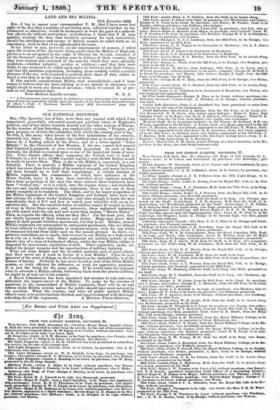LAND AND SEA MILITIA.
27th December 1848.
Sat—I beg to assure your correspondent F. H., that I have never lost sight of the fact that a number of sea-faring men, collected together by im- pressment or otherwise, would be inadequate to work the guns of a man-of- war effectively without instruction; nevertheless, I think that F. H. may possibly overrate the time that would be necessary for au& instruction, should the intelligence and energy of British seamen be called forth on an emergency, such as that of an apprehended invasion.
In my letter to you, however, on the impressment of seamen, I relied upon the readers of the Sfectator being aware that the Militia of England, previous to an act passed in the reign of Charles the Second, consisted of all the freemen* capable of bearing arms in defence of their country, that they were trained and exercised in the arm for which they were specially qualified,—whether infantry, cavalry or artillery,—and that they were liable at any moment to be called upon and to be forced to join their colours, and that the maritime population, including those residing within a certain distance of the sea, were required to perform their share of duty either on board a war ship or in the coast batteries or forts.
If this ancient constitutional Militia were refistablished,—and I have reason to believe that the laws relating to it are merely in obeyance,—we might laugh to scorn any threat of invasion ; which we cannot do at pre- sent in our unprepared state.
• "A Freeman may most properly be defined as every grown man who maintains himself and his immediate family upon the results of his own freely disposed means of effort."—Fide .T. Totilman Smith's Local Self Gorernment, page 243. Published in 1851.






































 Previous page
Previous page